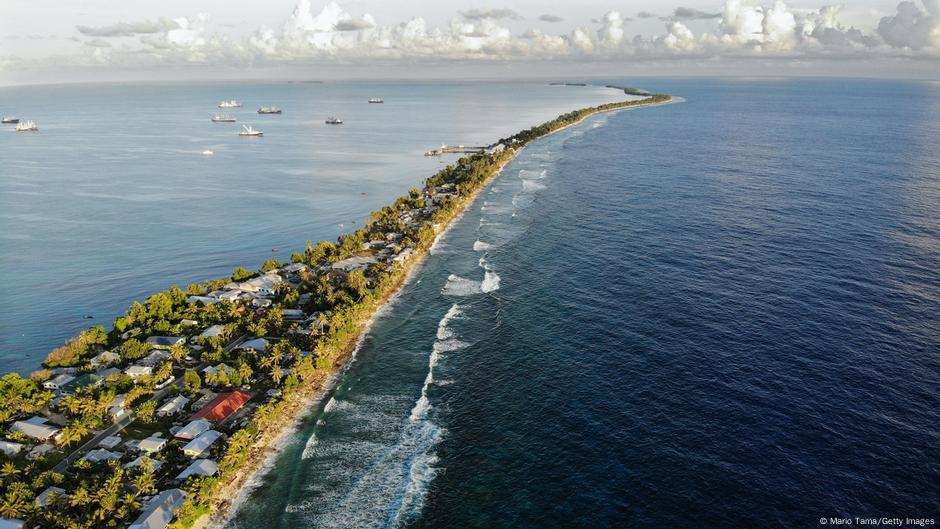Climate Crisis and New Opportunities for Tuvaluans
As the rising seas threaten to engulf the island nation of Tuvalu, a new initiative by Australia offers a glimmer of hope. The “climate visa” is designed to provide Tuvaluans with options in the face of an escalating climate crisis. This innovative approach reflects a growing recognition of the unique challenges faced by small island nations like Tuvalu.
In this South Pacific country, home to just over 10,000 people, one in three citizens has already registered for a groundbreaking climate visa that could allow them to permanently relocate to Australia. Tuvalu’s vulnerability to climate change is well-documented, with its capital, Funafuti, being a thin strip of land surrounded by a vast lagoon and the Pacific Ocean. Half of the population resides in this area, which is increasingly at risk from flooding due to rising sea levels.
Scientists warn that the entire island could be underwater within 35 years, posing an existential threat to the nation’s future. With 70% of the population between the ages of 15 and 64, the urgency for action is clear.
A Model for Climate Change Response
In November 2023, Australia responded to Tuvalu’s call for assistance by signing the Falepili Union Treaty. This agreement focuses on climate cooperation, dignified mobility, and shared security. After months of domestic discussions, the treaty is now in effect, marking a significant step forward in addressing the impacts of climate change.
Starting in 2025, a special mobility pathway will allow up to 280 Tuvaluans each year to live, work, or study in Australia. This initiative aims to support those most affected by climate change while preserving Tuvalu’s cultural identity and sovereignty.
Preserving Identity and Security
The treaty emphasizes the deep ancestral ties that Tuvaluans have to their land and sea. It commits to maintaining Tuvalu’s statehood and sovereignty even if its land becomes uninhabitable. Additionally, it grants Tuvaluans the freedom to travel between Australia and their homeland without restrictions.
In terms of regional security, Australia has pledged to assist Tuvalu in case of major natural disasters, public health emergencies, or military aggression. This commitment underscores the importance of collaboration in addressing climate-related challenges.
How the Falepili Union Works
Each year, a secret ballot will select 280 individuals who are over 18, hold a Tuvaluan passport, and were either born in Tuvalu or have a parent or grandparent born there. This process ensures that those most in need are prioritized, as those with existing citizenship in other countries are ineligible.
The visa also extends to individuals with disabilities, chronic health conditions, or special needs—groups often overlooked in traditional visa programs. Over 3,000 applications have already been submitted for the first round, highlighting the high demand for this opportunity. However, with only 280 spots available annually, applicants may face a wait of over a decade, although the treaty allows for adjustments if needed.
What Makes a ‘Climate Visa’ Different?
Unlike traditional visas that tie migration to work or study requirements, the Falepili Union Treaty allows winners of the ballot to move freely without being bound to specific jobs or courses. Experts like Jane McAdam, a law professor at the University of New South Wales, highlight the potential benefits of this approach. For some, it could mean better education for their children, while for others, it might offer job opportunities and remittances.
Permanent residency under this program comes with various benefits, including subsidized education, medical insurance, disability insurance, family tax benefits, childcare subsidies, and youth allowances.
Refugee vs. Climate Migrant: Understanding the Difference
Traditionally, climate migrants have fallen into a legal gap, as seen in a 2022 case in New Zealand where a deaf Tuvaluan man was denied protection despite his inability to hear evacuation warnings. This highlights the need for clearer international frameworks to address the unique challenges faced by climate migrants.
Kamal Amakrane, head of the UN’s Global Centre for Climate Mobility, notes that the Falepili Union Treaty represents a shift in how climate change refugees are addressed. He explains that it is not a refugee visa but a climate mobility pathway, recognizing climate change as a factor while preserving agency and dignity.
Global Implications and Future Directions
Tuvalu is not alone in facing these challenges. Countries like the Maldives, Marshall Islands, and Kiribati also confront similar threats and could benefit from regional climate-mobility frameworks. The US has long had Compacts of Free Association with Micronesia, the Marshall Islands, and Palau, allowing their citizens to live and work freely in the US. However, these arrangements offer limited access to public benefits and expose migrants to risks.
Other regional plans are emerging, such as the Kampala Ministerial Declaration on Migration, Environment, and Climate Change, which pledges coordinated responses for those affected by climate change. Despite these efforts, the crisis continues to deepen, with over 80% of new disaster displacements occurring in the Asia-Pacific region between 2008 and 2018.
Experts emphasize the importance of helping people adapt and stay in their homes if possible. As Kamal Amakrane states, “People do not want to leave the place they call home. So how do we help people stay where they belong? Enable their positive adaptation journey.”







